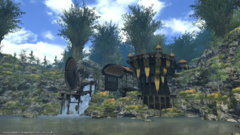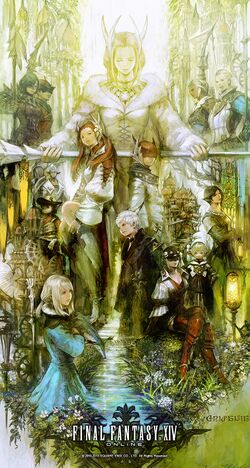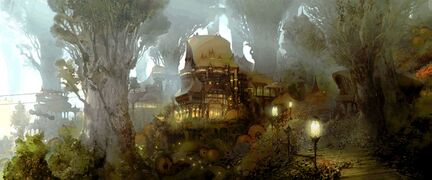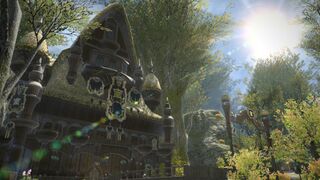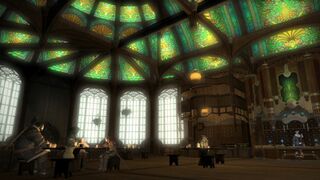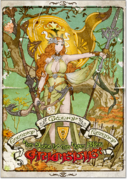Gridania
Gridania
- Type
- City
- Zone
- The Black Shroud
(Aldenard) - Aetherytes
- Gridania Aetheryte Plaza (X:11.9, Y:11.8)
“"Wood's Will Be Done."
In the eastern reaches of the Aldenard landmass, home to vast, dense woodlands and coursing rivers, lies the forest nation of Gridania. Nestled in the thick foliage of the sacred forest, the woodland city-state rules over the lands of the Black Shroud (as it is known by outsiders), or the Twelveswood (as it is known by those who live within the wood).— In-game description
Gridania is a city in The Black Shroud.
General Information
“In the eastern reaches of the Aldenard landmass, home to vast, dense woodlands and coursing rivers, lies the forest nation of Gridania. The cityscape is a mosaic of labyrinthine waterways and great wooden structures, so gracefully constructed they seem a part of the surrounding environment.
The Gridanian emphasis on natural harmony has led to its preeminence among Eorzea's city-states in trades such as forestry, agriculture, carpentry, and leatherworking. Gridania is also home to the Wood Wailers, a militant band of polearm-wielding sentries charged with the protection of their homeland.
The favored goddess of the citizenry is Nophica, the Matron, but great faith is also placed in the wisdom of the Seedseers—young oracles who guide the nation based on the will of the forest's elementals.— Game Description
Gridania is one of the starting cities in Eorzea. The forest nation of Gridania, located in the wooded region of The Black Shroud, is guided by Seedseers, young oracles who possess the wills of the forest's elementals. The economy of Gridania is based on agriculture, forestry, carpentry and leatherworking.
Gridania Sidequests
Guilds
Gridania has the following Guilds:
- Lancers' Guild
- Archers' Guild
- Conjurers' Guild
- Botanists' Guild
- Carpenters' Guild
- Leatherworkers' Guild
Zones
Gridania consists of two zones, Old Gridania and New Gridania. Teleporting into Gridania places you at the main Aetheryte, in New Gridania.
Old Gridania
- Main article: Old Gridania
New Gridania
- Main article: New Gridania
Lavender Beds
- Main article: Lavender Beds
Historical
During Legacy, Gridania was not separated at all, but existed as a single zone.
Lore
Nestled amid the thick foliage of the sacred forest, the woodland city-state of Gridania rules over the lands of the Black Shroud (as it is known by outsiders), or the Twelveswood (as it is known by those who live within the wood). Constructed almost entirely from timbers felled with the blessing of the area's elementals, Gridania has also gained fame for its waterwheels, which harness the power of rivers flowing into the Jadeite Flood and drive the city's industry.
Flag
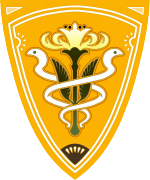
The white lily upon Gridania's standard signifies mankind's first congress with the elementals, while the golden field represents the lands filled with the elementals' power. The entwined serpents originate with the ancient subterranean city of Gelmorra, and proclaim the goodwill and unity of Elezen and Hyur in raising Gridania.
Motto
Wood's Will Be Done
Government
The rule of Gridania falls to the Seedseer Council, a body composed of chosen officials known as Hearers. These conjurers are able to commune with the elementals, and decide the course of the city-state through discussion and consensus. Around the time of the Calamity, however, Gridania's fate was so uncertain that Kan-E-Senna--the Elder Seedseer and head of the Council--assumed direct control. At present, she continues to preside over all affairs of state.
Leader
Ruling Body
Led by the Elder Seedseer, the Seedseer council is made up of Hearers, who rise as the most talented of Gridania's conjurers.
Racial Distribution
Midlander Hyur: 40%
Wildwood Elezen: 30%
Duskwight Elezen: 10%
Keeper of the Moon Miqo'te: 10%
Other: 10%
Religion
Nophica, tender of soils and goddess of the good harvest, is the patron deity of Gridania. While She does not want for devotees in other lands, only in the Twelveswood does one find the curious belief that the elementals are sprung from Her essence. These beings are at once the force of the forest's vitality and its defenders, ever ready to purge invaders from amongst the trees. Their presence is felt most keenly in the everyday life of Gridanians, and many are the festivals and rituals performed in the honor of the elementals.
Guilds
Gridania is home to guilds representing lancers, archers, conjurers, leatherworkers, carpenters, and botanists.
Industries
Forestry:
The sounds of chopping and sawing can be heard in certain groves throughout the Black Shroud. Woodcutters fell timber only where directed, and act in accordance with plans drawn up by Hearers in negotiation with the elementals. Thus, loggers avoid divesting the forest of its natural bounty, and even go so far as plant a seedling for every tree hewn down.
Carpentry:
With the quantity and quality of the timber in the forest, it is natural that Gridanians should take to working wood. Indeed, there is precious little they cannot fashion--from everyday goods to armaments to buildings to riverbeds. The pride of Gridania carpentry is the waterwheel, which has no peer in design or craftsmanship
Farming:
Over time, people have abandoned gathering the Twelveswood's bounty for the table in favor of cultivating crops. Orchards can be found in cleared thickets throughout the Shroud, and Gridania's citizens share large gardens within the city itself.
Hunting:
To ensure no man is too greedy in his take, hunters who pursue game in the woods must abide by the regulations of the Trappers' League. The League also works to combat poachers, whose actions risk upsetting the balance of the forest.
Leatherwork:
The artisans of Gridania use the finest hide and bones that hunters can provide, and craft works of such quality as to garner the admiration of the entire realm. They ensure that never will any part of an animal go to waste.
Beliefs
Gridanians know the blessings bestowed upon them by the elementals, and heed well their will. Behind this lies a fear of disturbing the peace of the Twelveswood, and being cast from the forest by enraged elementals--just as the Ixal once were. Yet, Gridanians have earned a reputation as stubborn amongst the other city-states of Eorzea, as they can be so unyielding in their commitment to the forest laws as to appear unadaptable and brittle.
Diet
The bounty of the Black Shroud graces the Gridanian table, from fruit to vegetables to meat of forest game. Yet, there are a few who feel this fare lacks in flavor. As animal husbandry is forbidden--lest the creatures upset the wood's balance--dairy goods are few and far between. Instead, Gridanians drink Mun-Tuy tonic, a concoction brewed from beans of the same name. In fact, many products made of fermented Mun-Tuy are known as Gridanian delicacies the realm over.
"Oh, it’s a lovely drink, absolutely bursting with nutrients and goodness.”
Dametta of Hyrstmill on the properties of Mun-Tuy tonic.
Bonus
In her twenty-eight summers, Kan-E has developed a fondness for Mun-Tuy brew, and is surprisingly adept at the dances of mooglekind. [1]
History
Blood Between Men
In the latter 7th century of the Sixth Astral Era, the second migration of Hyur came upon Eorzea, forcing Elezen from their lands and into the Black Shroud. The elementals looked upon these settlers as intruders, and sought to purge their presence from amongst the trees. Surviving accounts of this period describe chaos: the Elezen lacked knowledge of the elementals’ existence, and knew not what attacked them. In time, they realized what had befallen their people, and sought respite from the merciless onslaught in the caverns deep beneath the forest. They escaped annihilation—but at the cost of many Elezen lives.
Fifty years later, population growth pushed the Hyur to enter the forest as well. Upon finding people already ensconced underground, they challenged the Elezen for ownership of the habitable caves. Quarrel soon led to conflict, and the two races came to cross blades time and again.
Gelmorra
Though this conflict raged for decades, overtures towards peace had begun by around the year 740. Realizing they had a common goal in avoiding the elementals’ hostile gaze, the Hyur and Elezen put aside their differences. The two war-weary races sealed a pact, that both might prosper beneath the Twelveswood. The fruit of their alliance was Gelmorra, a great subterranean city. For nearly three centuries, the Elezen and Hyuran labored to expand their home, burrowing between natural caves and shoring up the passages with walls of stone. In time, Gelmorra’s intricate network of tunnels would come to put any antlings’ nest to shame.
Around 1020, however, a great change came over the Twelveswood. Since times of old, the elementals had allowed the Ixal to live within their forest. Yet suddenly, they cast the beastmen from the Shroud. What caused such a radical change in the elementals? The commonly accepted reason is that the Ixal population had grown too great for their area of the forest to support. In enlarging their territory, they cleared new land without the elementals’ consent. For this defiance, exile was their reward.
When the Gelmorrans learned of this, they realized that a chance was upon them to negotiate for land above ground. Those versed in the magic gathered, seeking a way to commune with the elementals through their art.
A New Nation
For a long while, the mages’ attempts went unanswered. However, with perseverance came success. After fifty years of effort, they finally succeeded in relaying their wishes to the elementals. On the understanding that the Gelmorrans would defend the forest, the elementals gave them permission to return to the light of day. As a blessing and proof of the accord, they bestowed a glowing light upon Jorin Lightheart, the Hyuran leader of the mages. Thus, the Gelmorrans abandoned the caves, and began building a home amidst the Jadeite Thick. They christened this new city Gridania.
Just as people were growing accustomed to their lives above ground, a child was born to the house of Jorin. Curiously, the child had horns, and never seemed to age beyond childhood, no matter how many years passed. Most extraordinary of all, the child could hear the elementals’ thoughts, and began to act as their emissary. With time, Gridanians came to realize the child was the selfsame blessing given to Jorin—a bridge betwixt man and elemental. These horned beings came to be venerated as Padjal, and continue to be born to Hyuran houses on rare occasions. To this day, they serve as honored leaders of Gridania.
The Return of the Ixal
Driven from the Black Shroud, the Ixal settled in Xelphatol along Abalathia’s Spine. Few trees grow in this barren wasteland, and not nearly enough to build a new settlement. Yet this was not the least of their troubles: Ixali young born after the exile lacked pinion feathers, though none knew why. Unable to fly, the Ixal could no longer hunt as they once had. Their new lives, then, were characterized by scarcity and suffering.
To escape such hardships, the Ixal began to consider a return to the Twelveswood. Around the year 1360, the tribe united and marched on the Shroud, intent on felling timber. The Wood Wailers met their advance, and repulsed the invaders after a pitched battle. However, the Gridanians’ victory was hard-fought, and claimed many lives. This spurred the woodland city-state to create the Gods’ Quiver—an elite force charged with watching for foreign incursions into the forest.
The Autumn War
In the 1,468th year of the Sixth Astral Era, King Manfred of Ala Mhigo suddenly laid claim to the East Shroud. He raised a mighty army, and ordered it to cross the Velodyna River—the true border of Gridania. In haste, Gridania sent its Wood Wailers and Gods’ Quiver against the invaders. They met in the First Battle of Tinolqa, where Ala Mhigo triumphed over the defenders, and routed the Gridanians to Five Hangs.
In the face of crisis, Gridania entreated the other city-states of Eorzea to dispatch their armies. Since ascending the throne, Manfred’s unconcealed hunger for land had not gone unnoticed by Ishgard, Ul'dah, and Limsa Lominsa. In 1469, these three answered Gridania’s call with a great army. Reinforcements at its rear, Gridania rallied and drove the invading army back to East End. There, in the Second Battle of Tinolqa, the alliance forces slew General Gylbarde of Ala Mhigo, and Gridania was victorious in defending its borders.
Known as the Autumn War, this conflict demonstrated to the realm that Gridania had answered the elementals’ call and stood ready to defend the Twelveswood from all intruders. Nevertheless, in more recent times Ala Mhigo has fallen into the hands of the Garlean Empire, and Gridania has done little to halt the imperial advance. At present, the fate of the woodland city-state has grown uncertain. [2]
